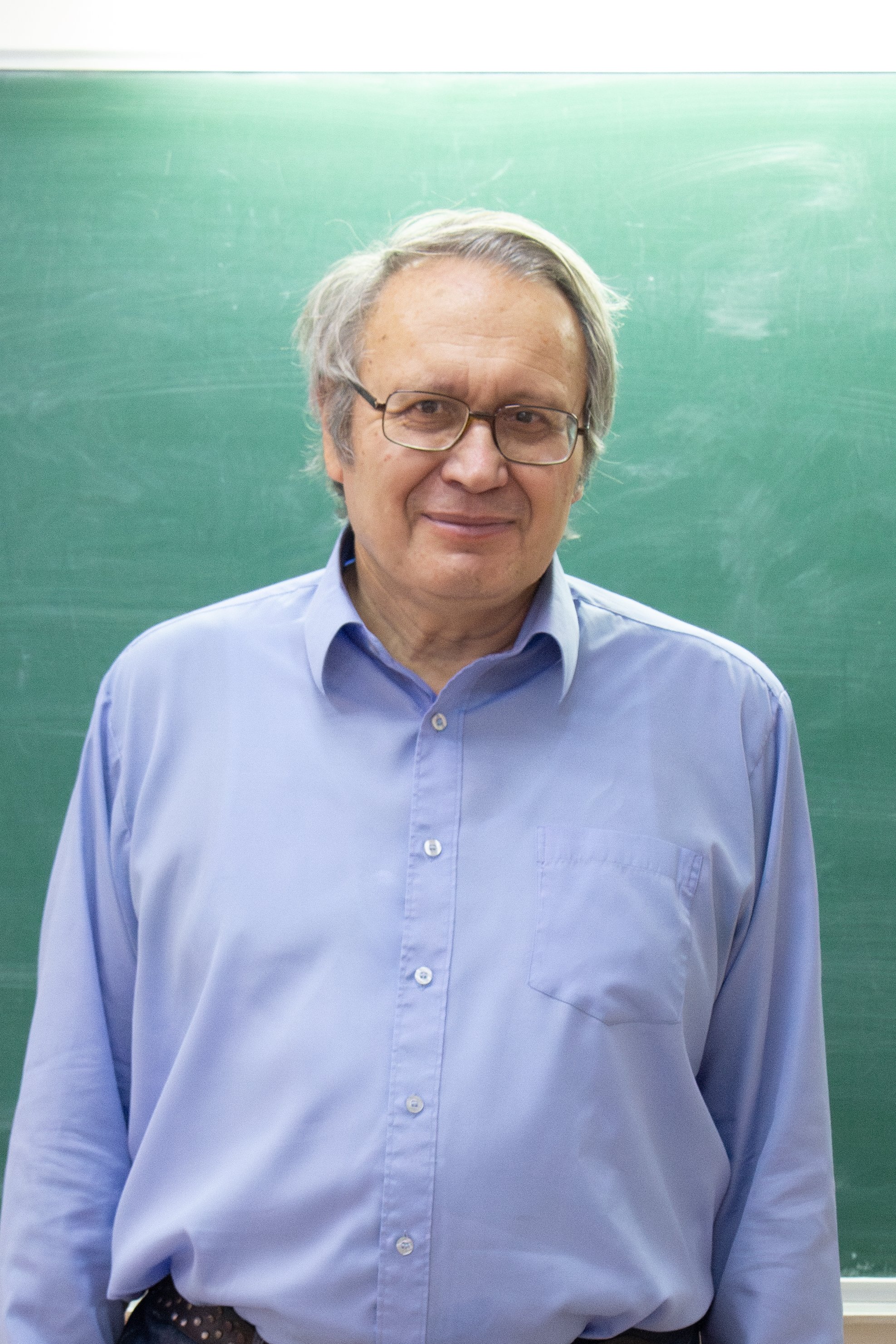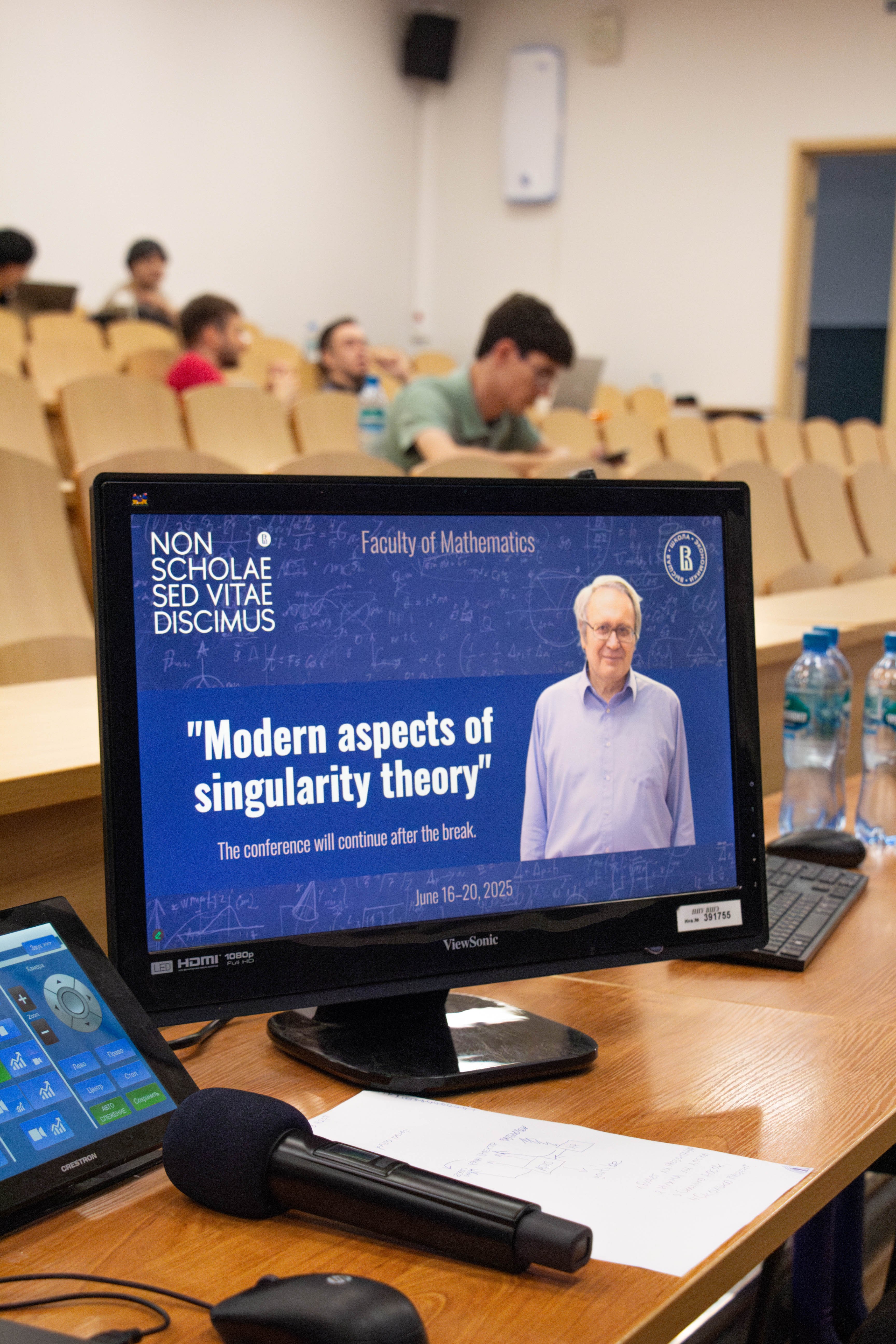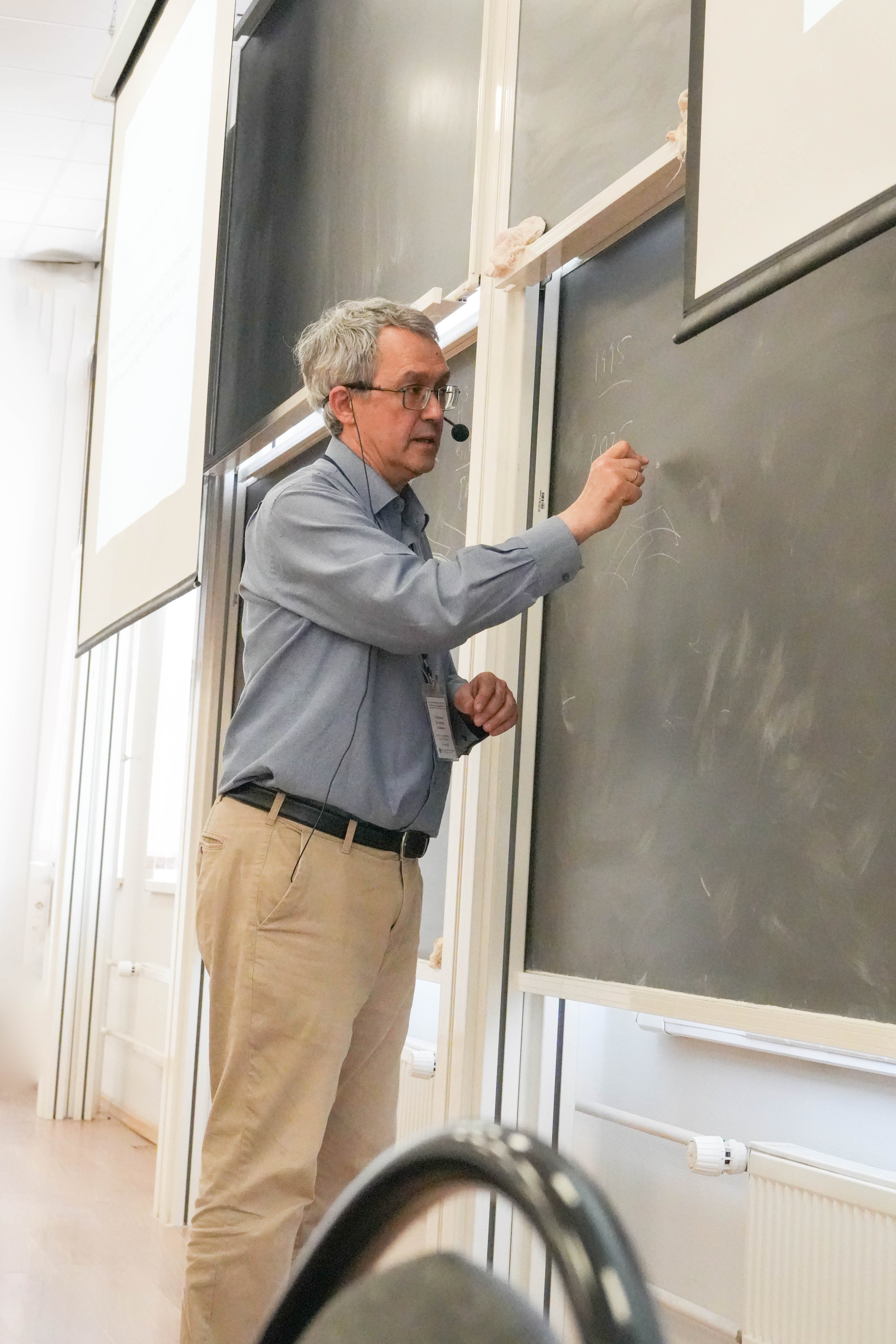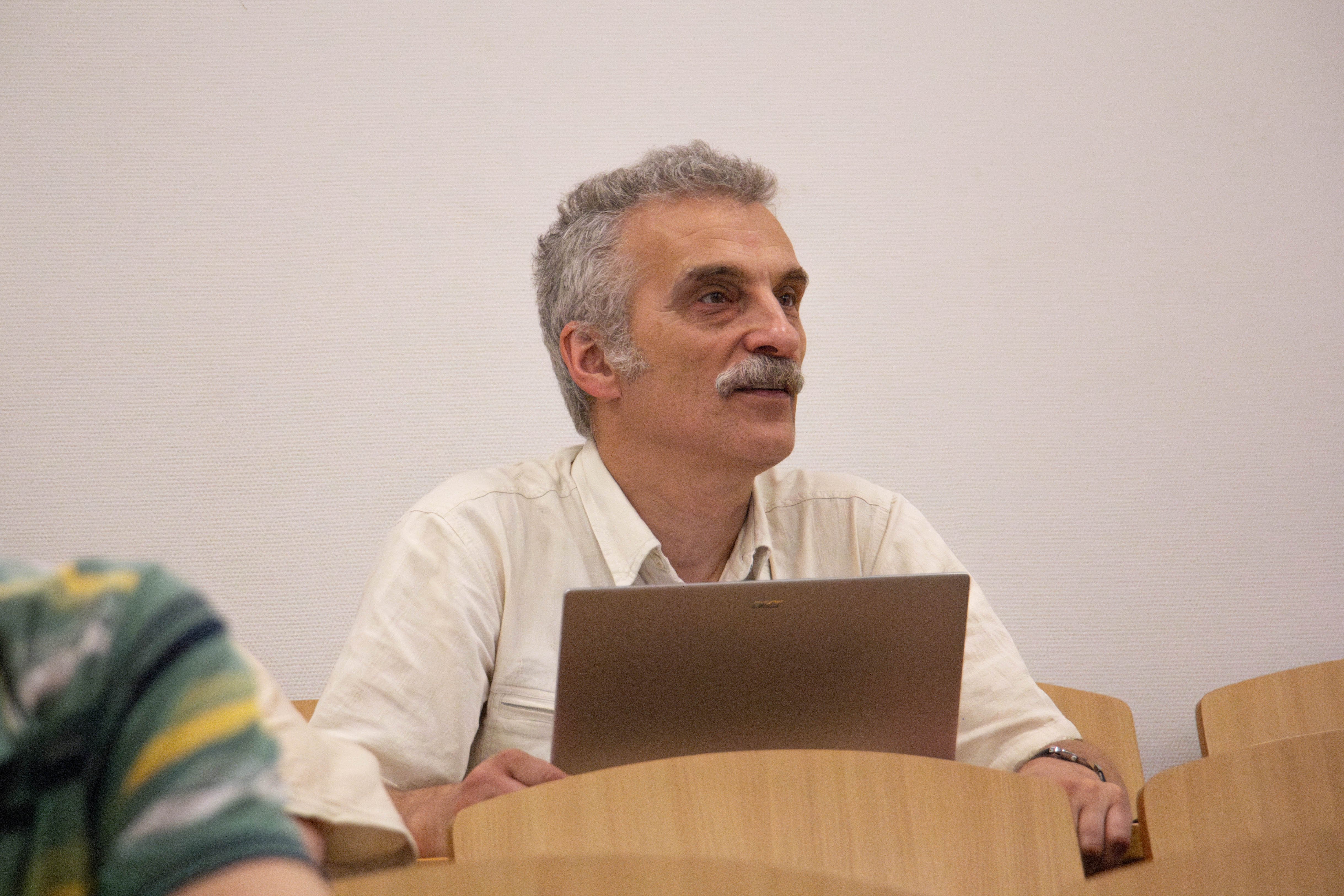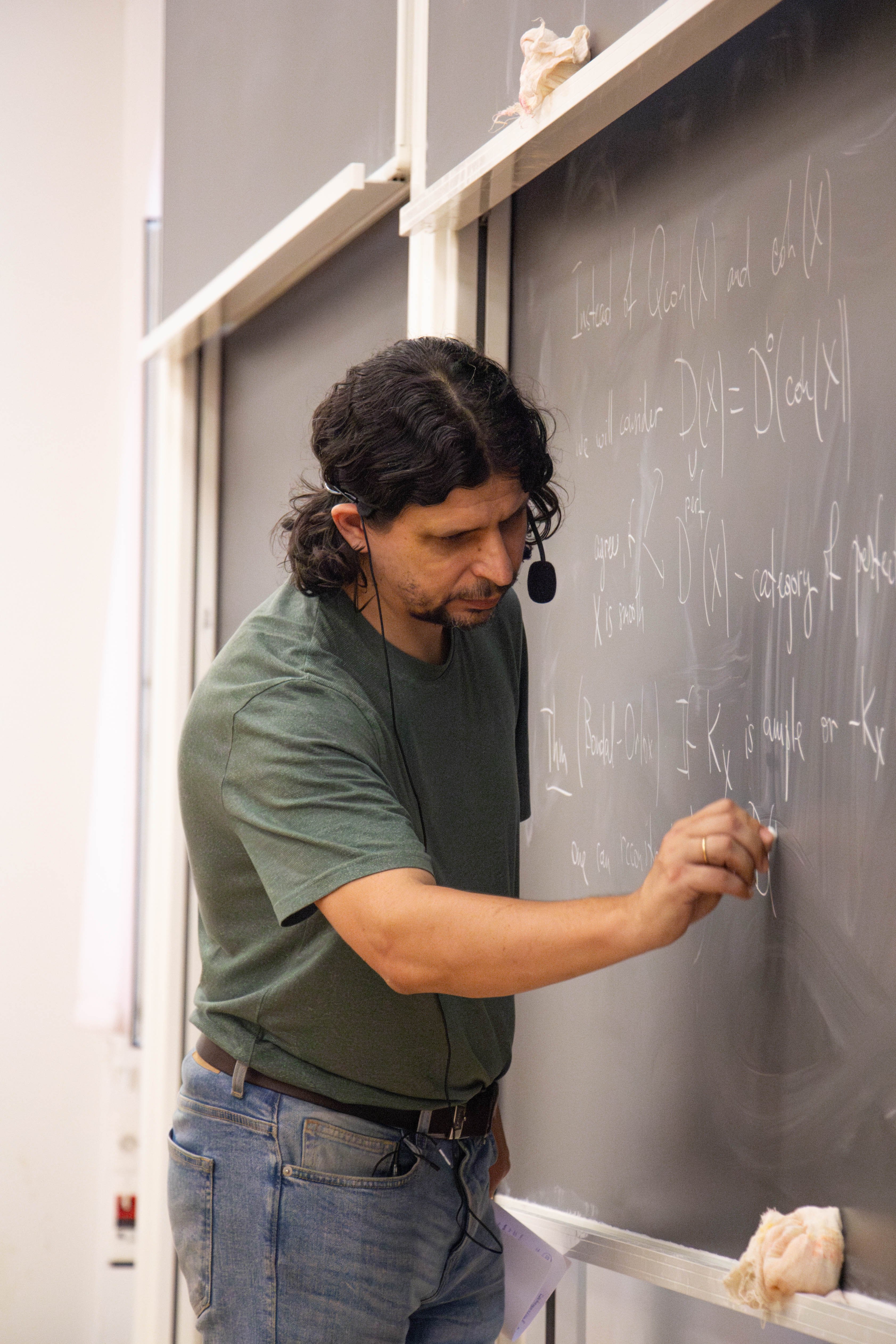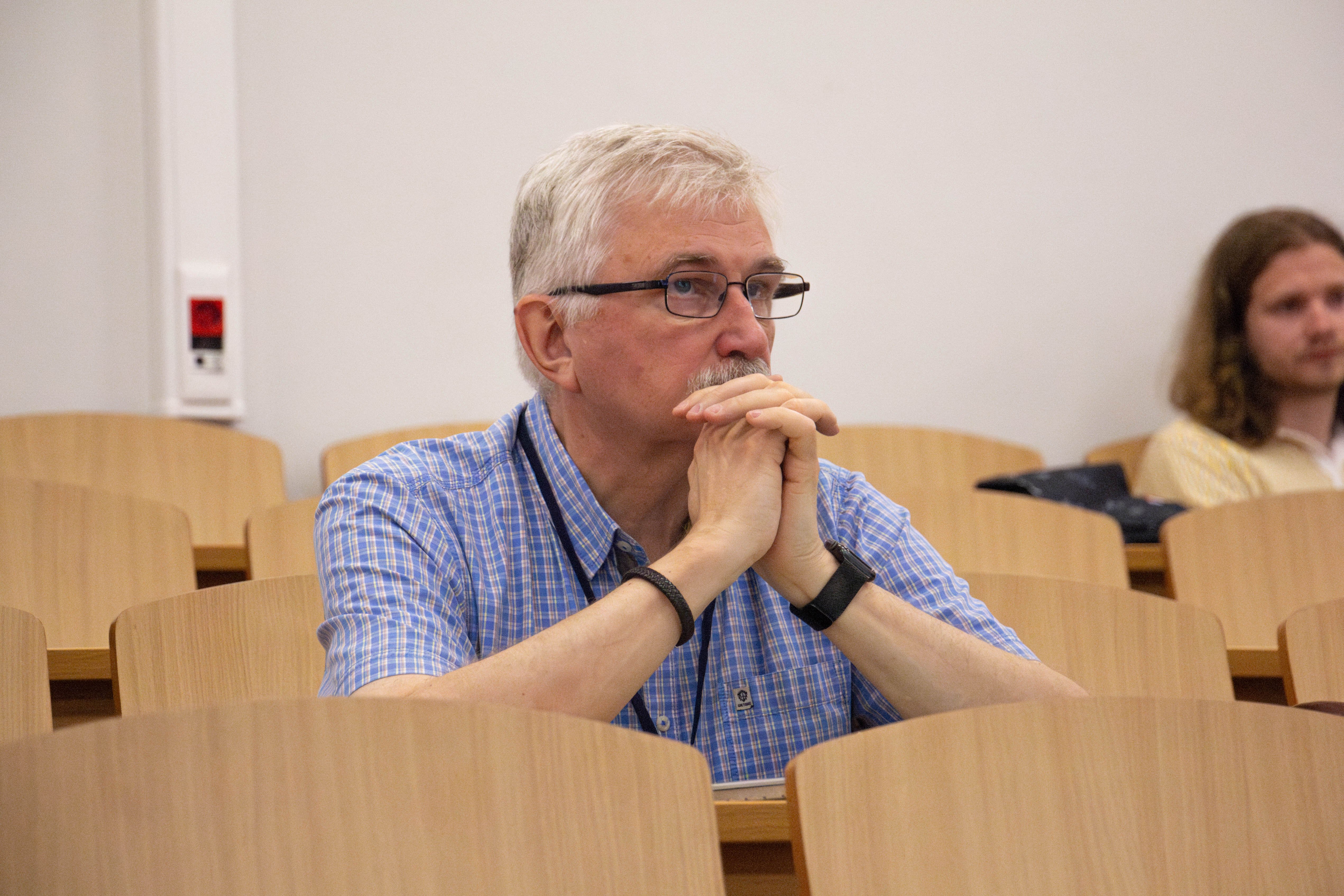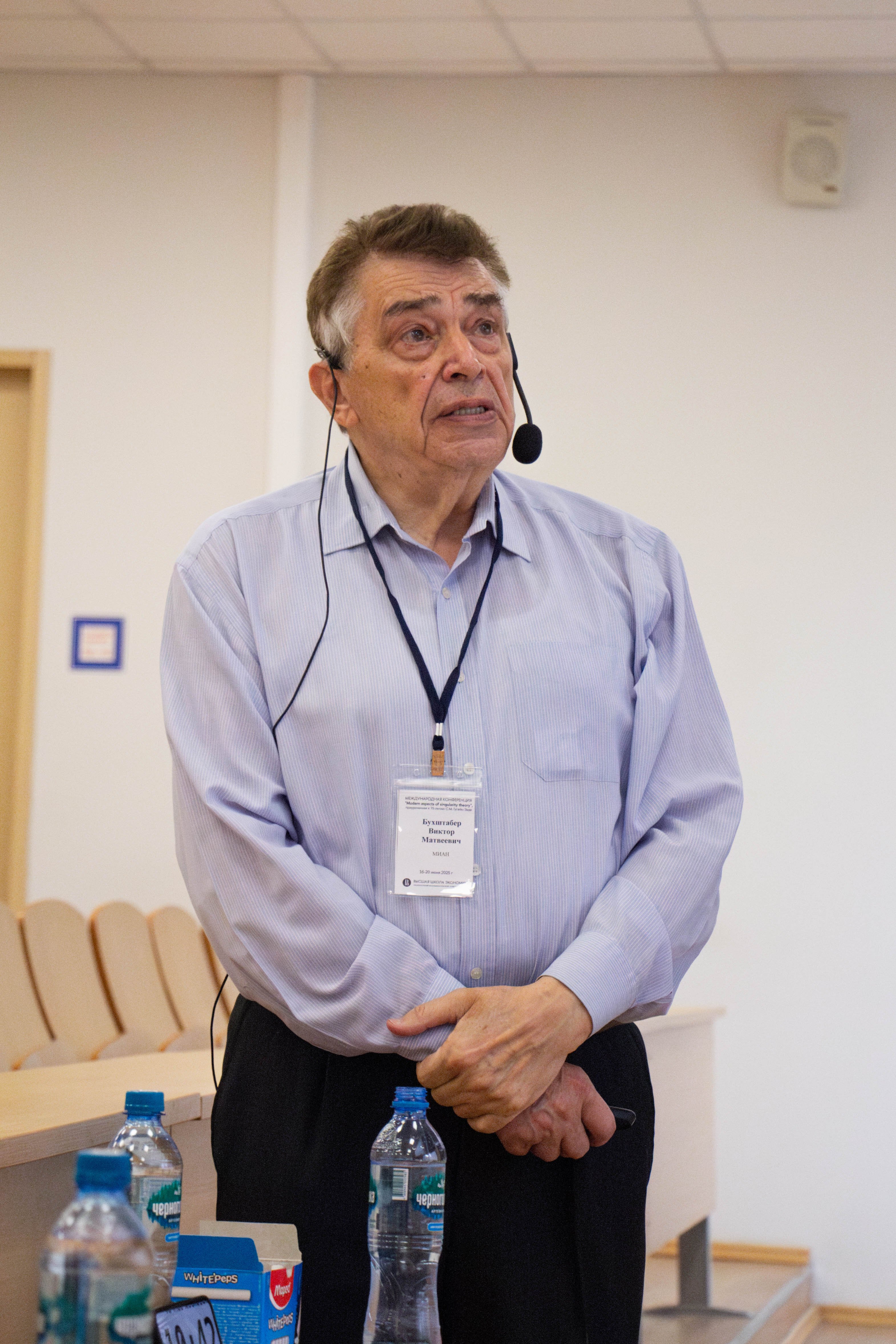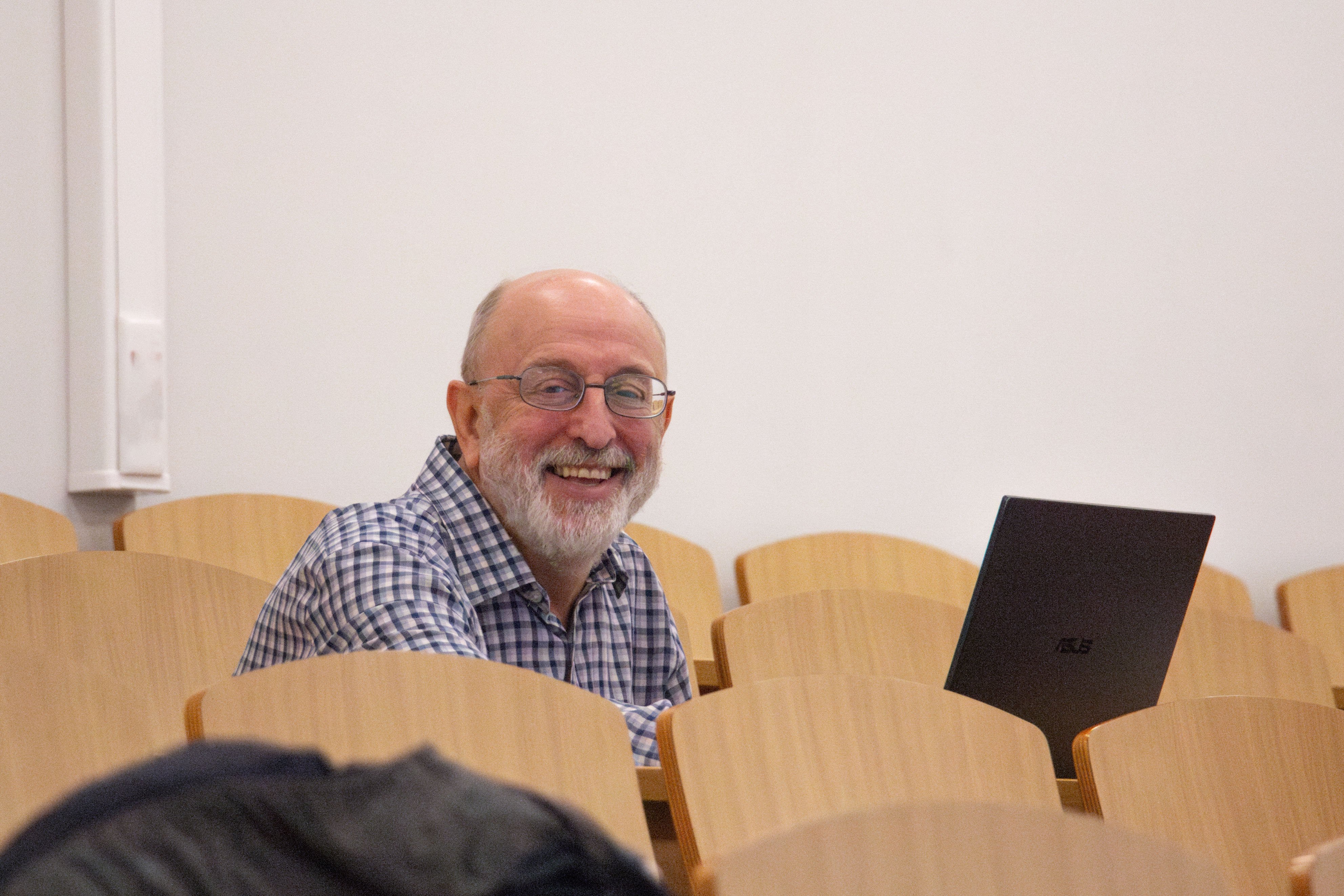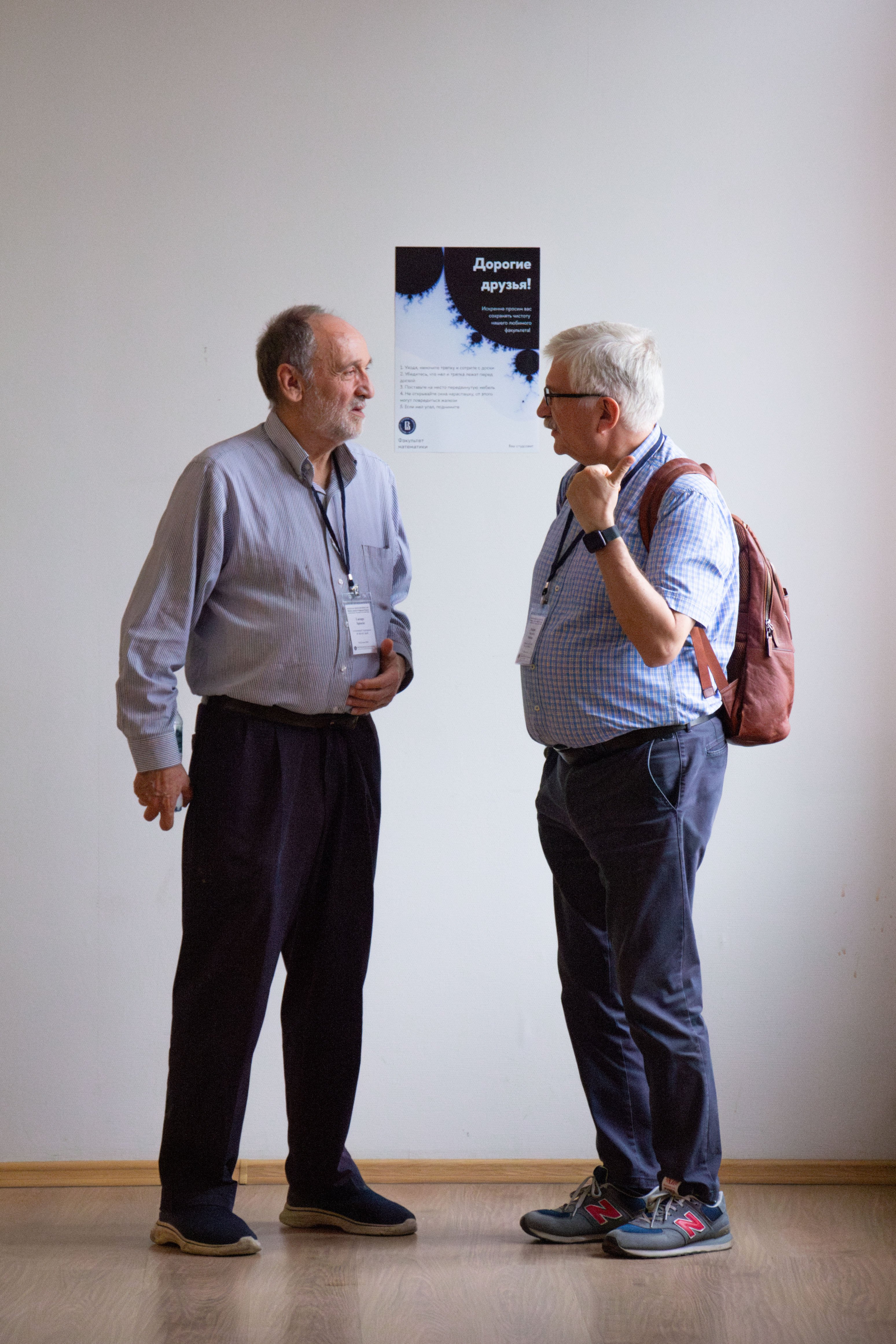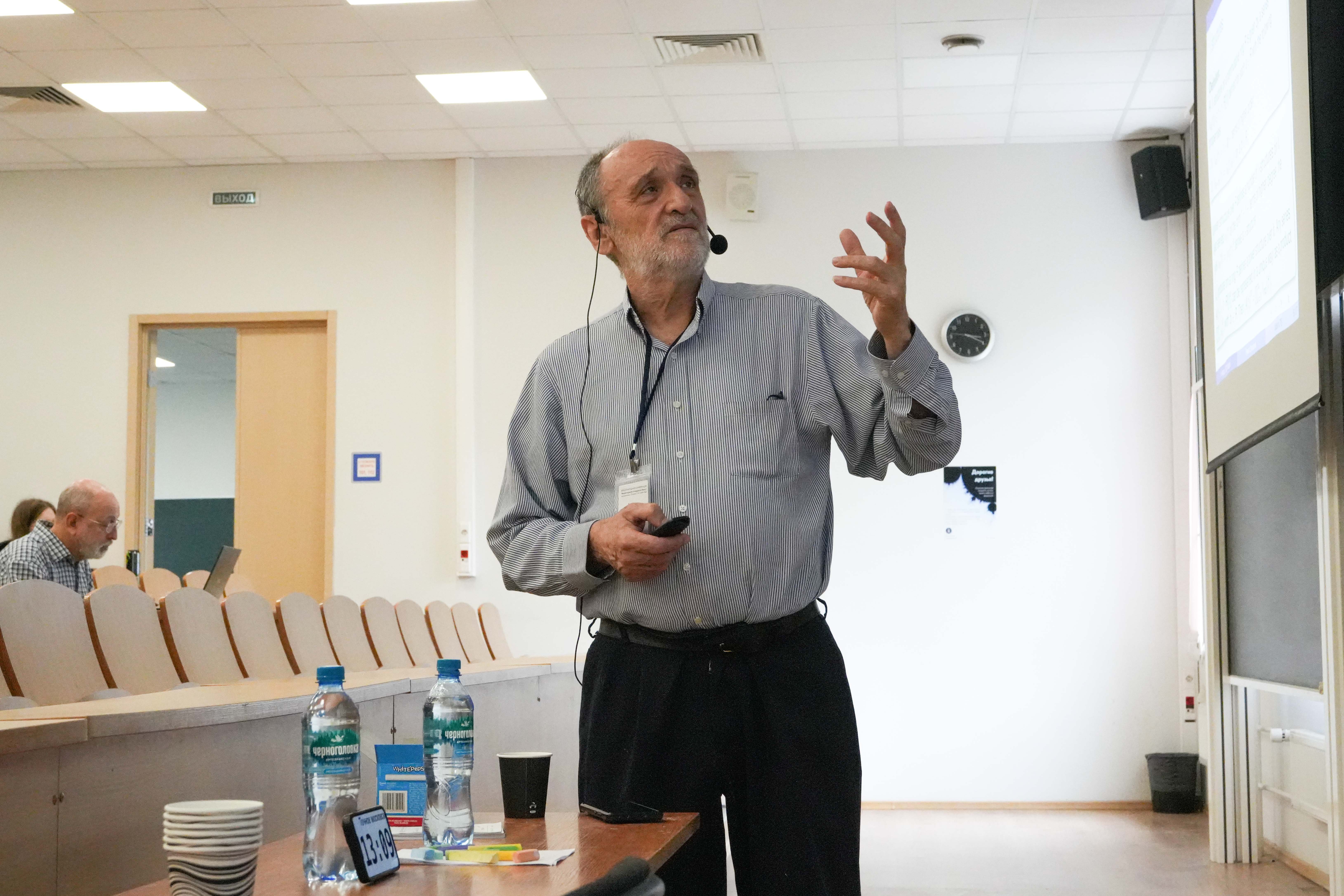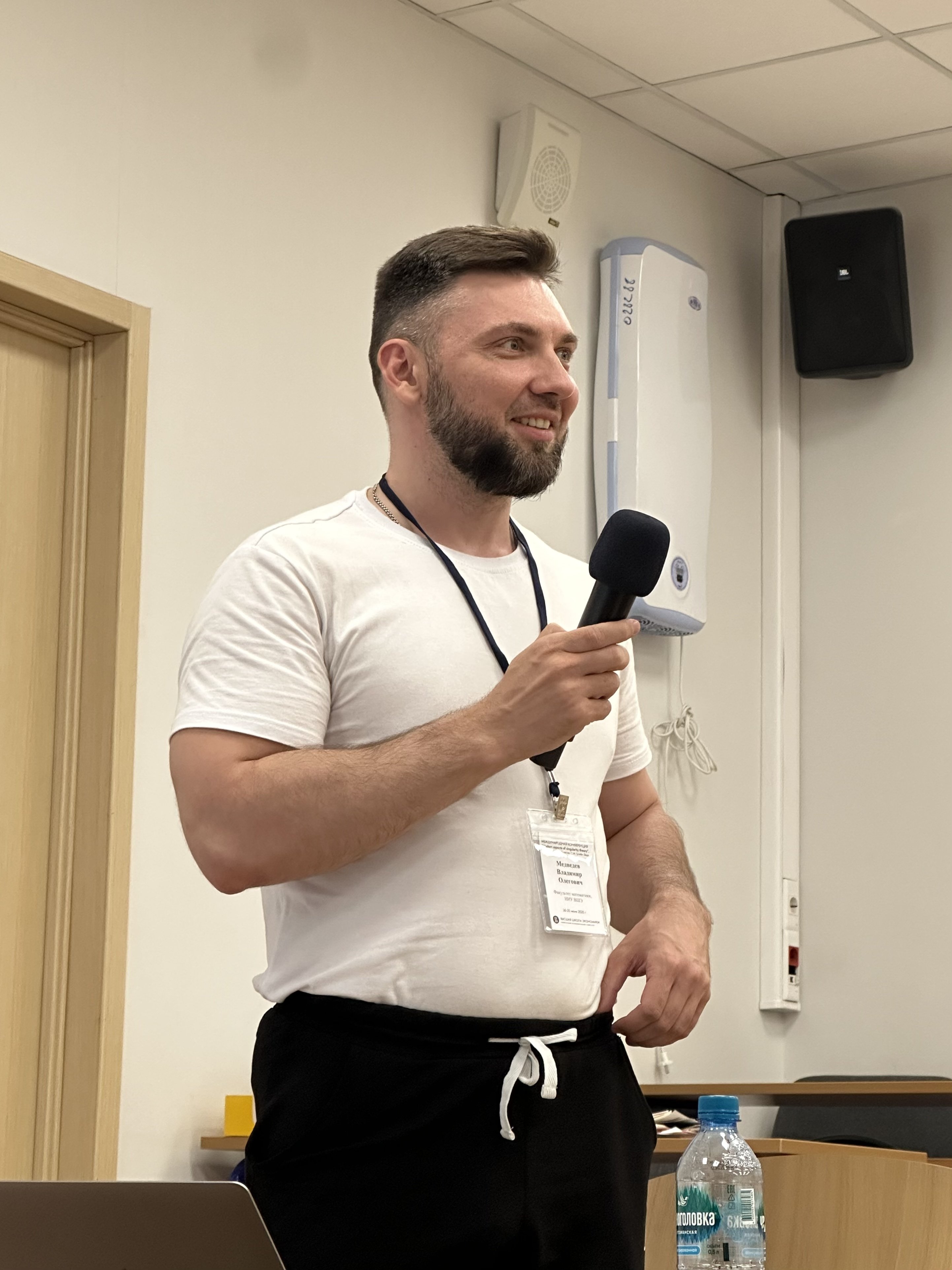International Conference "Modern aspects of singularity theory", dedicated to the 75th birthday of Sabir M. Gusein-Zade
General information
The conference will be held in the Faculty of Mathematics of the HSE University (Usacheva str. 6, Moscow).
Dates: 16 - 20 June 2025
Organizers: A. Buryak, V. Medvedev, A. Skripchenko
Speakers
V. M. Buchstaber (Moscow, Russia)
A. Campillo (Valladolid, Spain, online)
A. A. Davydov (Moscow, Russia)
F. Delgado (Valladolid, Spain)
H. Fan (Wuhan, China)
V. V. Fock (Strasbourg, France, online)
E. A. Gorsky (Davis, USA, online)
S. O. Gorchinskiy (Moscow, Russia)
V. V. Goryunov (Liverpool, United Kingdom, online)
M. E. Kazarian (Moscow, Russia)
A. G. Khovanskii (Toronto, Canada, online)
A. G. Kuznetsov (Moscow, Russia)
S. K. Lando (Moscow, Russia)
I. Luengo (Madrid, Spain)
G. B. Mikhalkin (Geneva, Switzerland)
E. I. Shustin (Tel Aviv, Israel, online)
A. Szenes (Geneva, Switzerland, online)
I. A. Taimanov (Novosibirsk, Russia)
A. N. Varchenko (Chapel Hill, USA)
A. P. Veselov (Loughborough, United Kingdom, online)
A. Y. Vesnin (Novosibirsk, Russia)
Video of the talks
Pictures from the conference
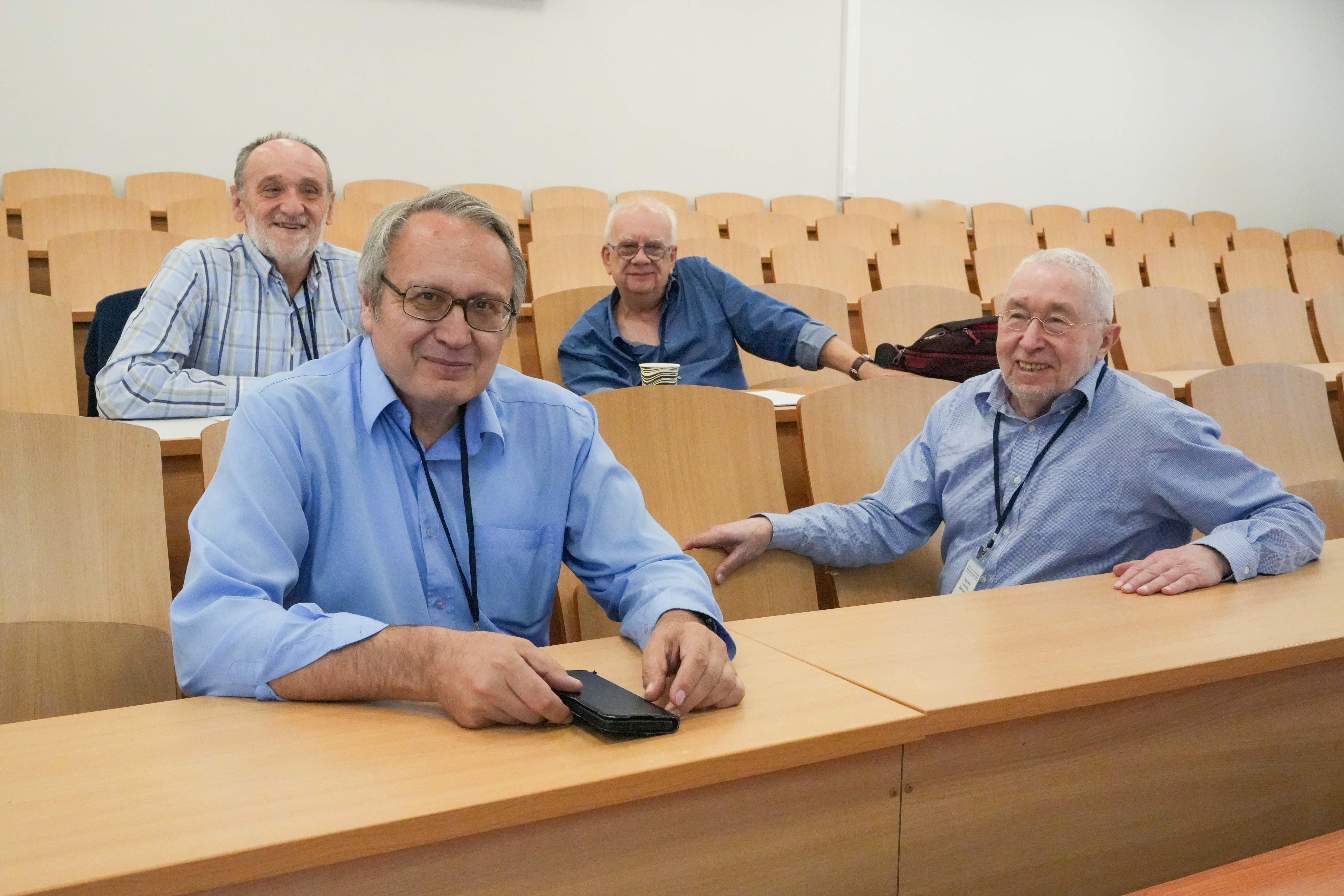
Conference program
Monday, 16 June
10:00 – 10:50 A. N. Varchenko – "Differential KZ equations in characteristic p"
11:00 – 11:50 F. Delgado – "On Poincaré series of valuations on subfields of complex numbers"
11:50 – 13:00 Lunch
13:00 – 13:50 S. K. Lando – "Weight systems associated to Lie algebras"
13:50 – 14:10 Coffee break
14:10 – 15:00 A. Szenes (online) – “On the enumerative theory of map singularities”
15:10 – 16:00 I. A. Taimanov – “Dynamical systems on central extensions of Lie algebras and symplectic nilmanifolds”
Tuesday, 17 June
10:00 – 10:50 M. E. Kazarian – "xy swap duality in topological recursion"
11:00 – 11:50 A. Campillo (online) – "Laurent series and Poincaré series"
11:50 – 13:00 Lunch
13:00 – 13:50 G. B. Mikhalkin – “Wave front propagation and caustics in the tropical plane”
13:50 – 14:10 Coffee break
14:10 – 15:00 V. V. Goryunov (online) – "Second Arnold-Maslov classes and some loops in the spaces of Legendrian and Lagrangian maps of surfaces"
15:10 – 16:00 A. G. Kuznetsov – "Categorical resolutions of singularities"
Wednesday, 18 June
10:00 – 10:50 V. M. Buchstaber – "n-valued groups"
11:00 – 11:50 E. I. Shustin (online) – "Topology of expressive curves"
11:50 – 13:00 Lunch
13:00 – 13:50 I. Luengo – “Power Structures”
14:30 Buffet (at the dining hall)
Thursday, 19 June
10:00 – 10:50 H. Fan – “Landau-Ginzburg model, tt* geometry and integrable system
11:00 – 11:50 A. P. Veselov (online) – "Differential algebra of polytopes and inversion formulas"
11:50 – 13:00 Lunch
13:00 – 13:50 A. Y. Vesnin – "Invariants of spatial graphs and corresponding knots and links"
13:50 – 14:10 Coffee break
14:10 – 15:00 V. V. Fock (online) – "Singularities and clusters"
15:10 – 16:00 A. G. Khovanskii (online) – “Newton polyhedra and affine algebraic varieties”
Friday, 20 June
10:00 – 10:50 S. O. Gorchinskiy “Powers structures on Grothendieck rings of varieties”
11:00 – 11:50 A. A. Davydov – “On optimization of cyclic processes”
11:50 – 13:00 Lunch
13:00 – 13:50 E. A. Gorsky (online) – "Compactified Jacobians and generic curves"
13:50 – 14:10 Coffee break
Abstracts of the talks
V. M. Buchstaber (Moscow, Russia)
n-valued groups
In 1971, V. M. Buchstaber and S.P. Novikov proposed a construction motivated by the theory of characteristic classes of quaternion vector bundles. This construction describes a multiplication in which the product of any pair of points is a multiset of n points. An axiomatic definition of n-valued groups, the results of their algebraic theory, and topological applications were obtained in a subsequent series of works by V. M. Buchstaber. Currently, the theory of n-valued (formal, finite, discrete, topological, and algebro-geometric) groups and their applications in various areas of mathematics and mathematical physics are being developed by a number of authors; The talk will present problems from various areas of mathematics, in the solution of which the results of the theory of n-valued groups played an important role.
A. Campillo (Valladolid, Spain)
Laurent series and Poincaré series
Joint work on Poincaré series with Felix Delgado and Sabir Gusein-Zade, and that of other collaborators, along last 30 years had provide surprising and fruitful contributions to singularities and combinatorics. Poincaré series are associated to multiindex filtrations and they are computed by means of calculus with Laurent series, natural integrals and analytic expansions. Analogous applications of Laurent series are also known in combinatorial geometry, for instance for describing lattice points or volumes of polyhedra. We describe such computations, analogies and expansions, focusing on some of the main applications of Poincaré series.
A. A. Davydov (Moscow, Russia)
On optimization of cyclic processes
At the beginning of this century, V.I. Arnold proposed a model for analyzing cyclic processes, which included a controlled system on a circle to describe motion along the cycle and a utility density function obtained during the traversal. A time-averaged functional was also introduced to optimize such processes.
Later, for continuous controlled systems and utility densities, it was proven that the optimal motion on the circle with respect to this functional is always achieved either by a cyclic process or in a steady state. Certain properties of the maximum time-averaged utility were also studied in generic one-parameter models.
The talk will focus on extending this theory to the case of renewable resource dynamics. In particular, we will address KPP and Fisher-type models on a torus or sphere.
F. Delgado (Valladolid, Spain)
On Poincaré series of valuations on subfields of complex numbers
Earlier, there was defined and computed the Poincaré series in several contexts, all of them in the complex case. In two recent papers we give definitions of the Poincaré series of a collection of valuations in the real setting (i. e., on the ring of germs of functions on a real analytic variety), compute them for the case of one curve or divisorial valuation on the plane and discuss some of their properties. Recently, we have extended the computations to the case of other subfields of the complex numbers for one curve or divisorial valuation.
The talk will focus on the case of a single valuation, pointing out the differences with the well-known case of branches over algebraically closed fields, as well as the qualitative difference between the semigroup and the Poincaré series.
The results have been obtained in collaboration with S. Gusein-Zade and A. Campillo.
H. Fan (Wuhan, China)
Landau-Ginzburg model, tt* geometry and integrable system
Singularity theory studies the local behavior of a map near its critical locus and is the main topic of algebraic geometry since the middle of last century. It can be also considered as part of Landau-Ginzburg model arising from the study of mirror symmetry. In this talk, I will report the progress on how to quantize the LG models via the method of geometrical analysis.
V. V. Fock (Strasbourg, France)
Singularities and clusters
In this talk we will describe a geometric relation between simple plane curve singularities classified by simply laced Cartan matrices and cluster varieties of finite type also classified by the simply laced Cartan matrices. We construct certain varieties of configurations of flags out of Dynkin diagrams and out of singularities and show that they coincide if the Dynkin diagram corresponds to the singularity.
E. A. Gorsky (Davis, USA)
Compactified Jacobians and generic curves
Given a plane curve singularity C, one can define its compactified Jacobian as a certain moduli space of sheaves on C. In the talk, I will define compactified Jacobians and review their properties, results and conjectures about them. In particular, I will define a class of “generic curves” and describe the homology of compactified Jacobians for these.
S. O. Gorchinskiy (Moscow, Russia)
Powers structures on Grothendieck rings of varieties
The talk is based on a work in progress with Danila Demin. In algebraic geometry the Grothendieck ring of varieties is being studied intensively, as well as its versions including the Grothendieck ring of varieties with actions of finite groups. There is a natural homomorphism between these rings and each of these rings has a natural lambda-structure defined in terms of (equivariant) symmetric powers of varieties. The homomorphism does not commute with lambda-structures. S.M. Gusein-Zade, I. Luengo, A. Melle-Hernandez introduced and studied the important notion of a power structure on a ring. Power structures are constructed from lambda-structures and different lambda-structures can lead to the same power structure. The main result is that the above homomorphism commutes with the power structures on the Grothendieck rings. This is obtained by means of a new general formula that expresses a power structure and the logarithm of a lambda-structure in terms of a combinatorics of trees.
V. V. Goryunov (Liverpool, United Kingdom)
Second Arnold-Maslov classes and some loops in the spaces of Legendrian and Lagrangian maps of surfaces
We introduce versions of the second Arnold-Maslov classes for paths in the spaces of Legendrian and Lagrangian maps of surfaces. We give an explicit construction — in terms of generating families — of loops in such spaces on which the values of the classes are the Euler characteristic of the surface.
M. E. Kazarian (Moscow, Russia)
xy swap duality in topological recursion
The topological recursion or the Chekhov-Eynard-Orantin recursion is an inductive procedure allowing one to solve in a uniform way many enumerative problems. The initial data of recursion involves two meromorphic functions on a Riemann surface denoted usually by x and y. The xy swap relations relate solutions of two topological recursions with the roles of the x and y functions swapped. The very existence of such relations implies numerous applications clarifying the nature of topological recursion, in particular:
- it leads to explicit closed formulas for the resulting differentials of the recursion in many cases that avoid the inductive procedure
- it allows one to extend the recursion to the case of degenerate pairs of x and y functions and to analyze the dependence of the resulting differentials on x and y functions
- it explains KP integrability property observed in many enumerative problems
The talk is based on a series of joint papers with A. Alexandrov, B. Bychkov, P. Dunin-Barkowsky, and S. Shadrin.
A. G. Khovanskii (Toronto, Canada)
Newton polyhedra and affine algebraic varieties
Let be a variety defined by a system of generic polynomial equations with given Newton polyhedra. We compute the number of irreducible components in of different dimensions and the multiplicity of irreducible components of dimension . In particular, when we compute the number of isolated points in of different multiplicities.
Unlike varieties in the torus , defined similarly, may have isolated points of arbitrary multiplicity and irreducible components of arbitrary dimension.
We also generalize these results to subvarieties in a smooth (possibly incomplete) -dimensional toric variety defined as the common null set of several sections of (possibly distinct) invariant line bundles over , assuming that these sections are generic with respect to given Newton polyhedra.
A. G. Kuznetsov (Moscow, Russia)
Categorical resolutions of singularities
In the talk I will try to show a categorical point of view on resolutions of singularities in algebraic geometry.
S. K. Lando (Moscow, Russia)
Weight systems associated to Lie algebras
V. A. Vassiliev's theory of finite type knot invariants allows one to associate to such an invariant a function on chord diagrams, which are simple combinatorial objects, consisting of an oriented circle and a tuple of chords with pairwise distinct ends in it. Such functions are called weight systems
. According to a Kontsevich theorem, such a correspondence is essentially one-to-one: each weight system determines certain knot invariant.
In particular, a weight system can be associated to any semi-simple Lie algebra. However, already in the simplest nontrivial case, the one for the Lie algebra sl(2), computation of the values of the corresponding weight system is a computationally complicated task. This weight system is of great importance, however, since it corresponds to a famous knot invariant known as the colored Jones polynomial.
Last few years was a period of significant progress in understanding and computing Lie algebra weight systems, both for sl(2)- and gl(N)-weight system, for arbitrary N. These methods are based on an idea, due to M. Kazarian, which suggests a recurrence for gl(N)-weight system extended to permutations. The recurrence immediately leads to a construction of a universal gl-weight system taking values in the ring of polynomials ℂ[N, C₁, C₂, C₃, …] in infinitely many variables and allowing for a specialization to gl(N)- and sl(N)-weight systems for any given value of N. A lot of new explicit formulas were obtained.
Simultaneously, Zhuoke Yang extended the construction to the Lie superalgebras gl(N|M), and, together with M. Kazarian, to other classical series of Lie algebras. It happened that certain specializations of the universal gl-weight system lead to well-known combinatorial invariants of graphs, allowing thus to extend these invariants to permutations.
Certain integrability properties of the Lie algebra weight systems will be discussed.
The talk is based on work of M. Kazarian, the speaker, and N. Kodaneva, P. Zakorko, Zhuoke Yang, and P. Zinova.
I. Luengo (Madrid, Spain)
Power Structures
This talk is based on our joint work with Sabir M. Gusein-Zade and Alejandro Melle-Hernandez that started in 2017 when we introduced the notion of power structure in a ring and defined a power structure in the Grothendieck ring of varieties. Power structures are a powerful tool to deal with geometric or arithmetic settings where motivic generating series play a role, like generating series of the classes of Hilbert schemes of points or Motivic Donaldson-Thomas invariants. We will present the development and several applications of the theory of power structures.
G. B. Mikhalkin (Geneva, Switzerland)
Wave front propagation and caustics in the tropical plane
The Eikonal equation of wave front propagation has its counterpart in the tropical geometry setting. The tropical plane does not have Euclidean metric. Instead, it has an integer lattice in each tangent space, and this structure defines the evolution of any planar convex curve into a polygonal curve in arbitrarily small time. Joint work with Mikhail Shkolnikov.
E. I. Shustin (Tel Aviv, Israel)
Topology of expressive curves
The talk is devoted to expressive curves introduced by S. Fomin and the speaker. These are real plane affine curves whose real point set provides complete information on the critical points of the defining polynomial. Expressive curves can be regarded as a global analog of real morsifications of singular points of plane curves, which were introduced and studied by S. Gusein-Zade and N. A'Campo. We discuss some results obtained jointly with S. Fomin and pose several open questions.
A. Szenes (Geneva, Switzerland)
On the enumerative theory of map singularities
Many questions in classical enumerative geometry may be formulated as the problem of counting points where a map between to smooth manifolds has certain types of singularities. In good cases, the answers are given in terms of universal polynomials in the characteristic classes of the map. I will review some recent, as well as some older results on calculating these universal objects.
I. A. Taimanov (Novosibirsk, Russia)
Dynamical systems on central extensions of Lie algebras and symplectic nilmanifolds
We will describe how the Euler equations on central extensions of Lie algebras are related to the Euler equations on the original, extended, algebras. We will also consider an infinite sequence of central extensions of nilpotent Lie algebras constructed from the Lie algebra of formal vector fields on the line, describe the orbits of coadjoint representations for these algebras, and, using compact nilmanifolds constructed from these algebras by I. K. Babenko and the author, show that covering Lie groups for symplectic nilmanifolds can have any rank as solvable Lie groups.
A. N. Varchenko (Chapel Hill, USA)
Differential KZ equations in characteristic p
The Knizhnik – Zamolodchikov (KZ) equations form a system of linear partial differential equations that exhibit profound connections with theoretical physics, representation theory, algebraic geometry, and integrable systems. In 1984, Vladimir Knizhnik and Alexander Zamolodchikov first introduced these equations within the context of conformal field theory to depict the behavior of correlation functions of vertex operators in two-dimensional quantum field theories. Since then, the equations have emerged as a central object in both mathematical physics and pure mathematics, bridging seemingly disparate fields such as Lie algebras, braid groups, hypergeometric integrals, congruences in number theory, and geometric topology. In this talk I will review properties of KZ equations in characteristic p.
A. P. Veselov (Loughborough, United Kingdom)
Differential algebra of polytopes and inversion formulas
There is a remarkable relation, due to Loday, between Lagrange inversion problem for formal series and combinatorics of Stasheff polytopes, also known as associahedra. Analogous link exists for the multiplicative inverse of the power series and special polytopes known as permutohedra.
I will explain how to prove these facts using the differential algebra of polytopes, following joint work with V. M. Buchstaber.
I will also discuss the link with the integrable PDEs and Deligne-Mumford moduli spaces in relation with the works of Witten, Kontsevich, Getzler and McMullen.
A. Y. Vesnin (Novosibirsk, Russia)
Invariants of spatial graphs and corresponding knots and links
Spatial graphs are embeddings of graphs in three-dimensional space. Therefore, the study of spatial graphs employs combinatorial and topological methods. Two spatial graphs are considered equivalent if they can be transformed into each other via an ambient isotopy of space. Since any cycle in a graph is embedded as a knot in space, the theory of spatial graphs naturally generalizes knot theory.
In this talk, we will present the relationship between Yamada polynomial invariants of certain classes of spatial graphs and Jones polynomials of their constituent knots and associated links.
